- In the next decade, MFG plans to invest circa £400 million in ultra-rapid 150kW and 350kW EV chargers across its UK network.
- MFG will install a total of circa 3,000 ultra-rapid 150kW and 350kW EV chargers at around 500 sites by the end of 2030.
- By 2035, MFG plans to complete its EV roll-out to all suitable remaining locations in its network.
- Ultra-rapid 150kW EV chargers can add 100 miles of range in approximately 10 minutes. MFG has the capability to increase charging speeds to 350kW as the battery technology becomes more widely available. This technology will result in similar refuelling times to fossil fuels
- By developing ultra-rapid 150kW and 350 kW EV charging hubs in strategic locations across the UK, MFG believes it is uniquely placed to alleviate range anxiety and increase driver’s confidence in electricity as a fuel source, thereby improving EV adoption
- MFG’s planned investment in EV charging will be made hand-in-hand with a broader upgrade programme, continuously upgrading its nationwide network of ’travel retail destinations’, with a broad grocery convenience offer, strong food-to-go brand partnerships, on-line delivery lockers and business break areas/facilities.
- MFG also plans to invest over £50m in 2021 to improve its retail, food to go, and valeting offer to the consumer.
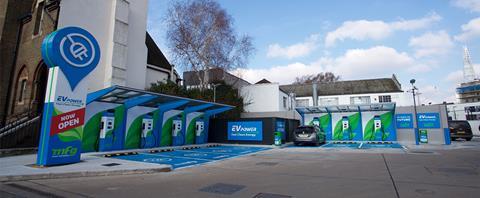
Number one Top 50 Indie MFG is to invest around £400m in ’ultra-rapid’ EV chargers for its 918-strong UK-network over the next decade. It also plans to invest over £50m in 2021 to improve its retail, food to go, and valeting offer to the consumer.
The EV charging investment will see some 3,000 150kW and 350kW EV chargers at around 500 sites by the end of 2030, with the rollout completed to all suitable remaining locations in its network by 2035.
The plans include developing EV charging hubs in strategic locations across the UK. MFG believes it is uniquely placed to alleviate range anxiety and increase driver’s confidence in electricity as a fuel source, thereby improving EV adoption. It says the 150kW chargers can add 100 miles of range in around 10 minutes, while the more powerful 350kW technology will result in simlar refuelling times to fossil fuels.
The hubs will consist of between four and eight ultra-rapid 150kW EV chargers per site, with a move to 350 kW chargers as vehicle battery technology improves, to maintain the fastest charging times across the MFG network. While these charging speeds are beyond the capability of most EV models currently on the market, MFG said it is investing ahead of the curve to build driver’s confidence in electricity as a fuel source and supporting the Government’s decarbonisation and sustainability agenda and emissions target of being net zero by 2050.
In 2021, MFG will build EV charging hubs at an additional 40 sites, offering over 200 ultra-rapid 150kW EV chargers. The initial focus will be on major trunk roads and urban areas. In London alone, MFG’s planned roll-out will treble the current number of open network ultra-rapid 150kW EV chargers.
From 2022 onwards, MFG plans to build at least 50 additional EV charging hubs per year. A significant number of these will be on the strategic road network.
The announcement reveals a significant change in focus for MFG’s EV strategy - it currently has EV chargers at 108 sites through third parties. MFG will self-fund, build, and operate its EV charging hubs, alongside this existing network, with the aim of becoming a truly national charge-point operator.
The Top 50 Indie said it is working with some of the world’s leading suppliers to deliver electric power to its forecourts and will continue to invest significant capital in its EV charging capabilities as global EV technology improves. As the company further establishes itself as a provider of essential infrastructure to enable the UK’s mobility revolution on the strategic road network, it intends to actively target other charging segments and expand its EV offering, either organically or through acquisition.
Over the coming decades, MFG will operate a dual fuel strategy - continuing to provide existing fossil fuel infrastructure while rolling out EV charging hubs. It said its planned investment in EV charging will be made hand-in-hand with a broader upgrade programme across its sites - which it describes as ‘travel retail destinations’ - which offer a broad grocery convenience offer, strong food-to-go brand partnerships, on-line delivery lockers and business break areas/facilities.
Given the slow churn of the car parc – on average, cars are 14 years old at point of scrappage – millions of motorists will require fossil fuels long after the 2030 ban on the sale of new petrol or diesel cars. Therefore MFG is committed to supporting these motorists by providing necessary fossil fuel infrastructure, while enabling their transition to clean fuels.
Battery electric vehicles accounted for 6.6% of all new car registrations in the UK in 2020, up from 1.6% in 2019. To meet Government targets, 100% of new registrations must be battery-electric by 2035. MFG recognises that to achieve full electrification, significant private and public infrastructure investment will be required.
MFG will also consolidate its position as one of the largest drop-box and home-delivery locations for major logistics companies such as Amazon, InPost, and ByBox. Through these partnerships MFG said it can help provide crucial last-mile delivery in an increasingly on-line retail environment.
MFG’s CEO, William Bannister, said: “Our planned £400 million investment in this vital infrastructure will help keep UK motorists on the move, and our essential retail will support local communities and the economy. I am looking forward to engaging with Government to ensure this investment best meets the national EV infrastructure requirement to help us all make a contribution to ensuring Britain meets its net zero target by 2050.”





















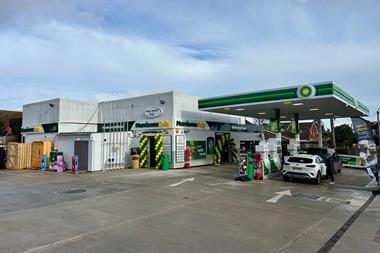
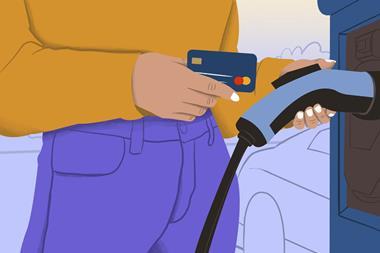
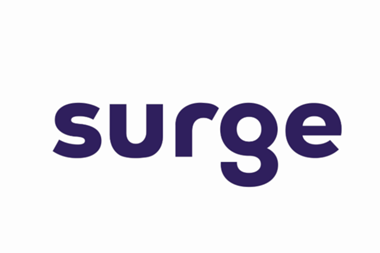
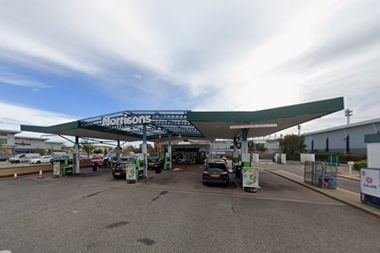








No comments yet